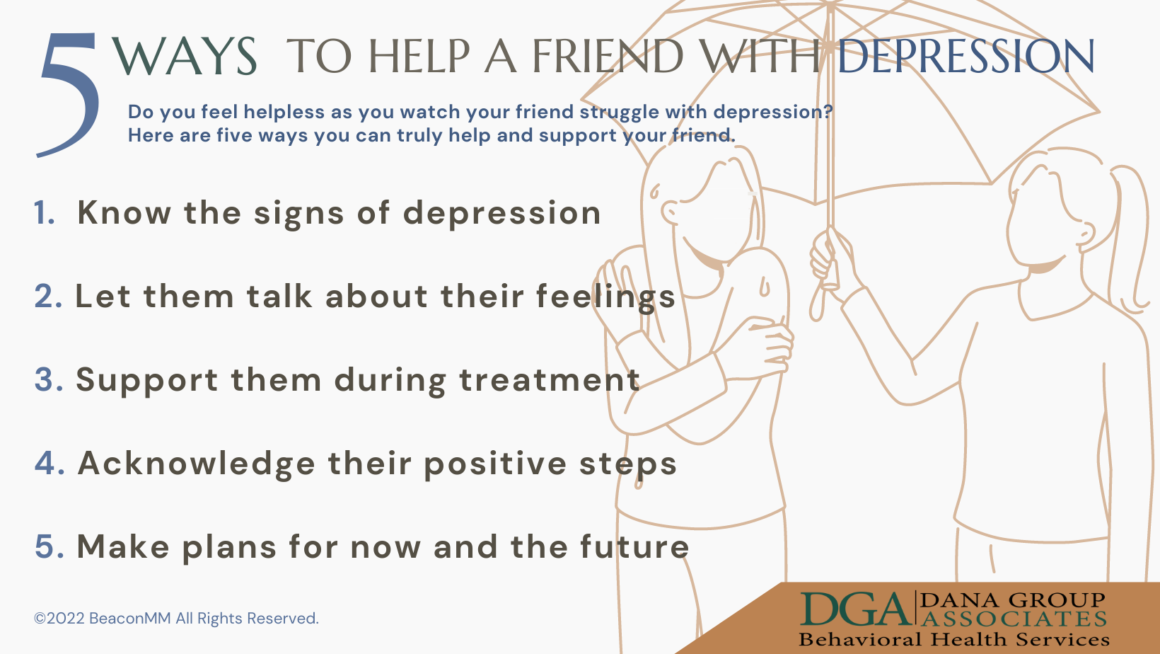When your friend is depressed, you want to help them feel better. You want them to get past the emotional pain so you can have the kind of friendship you had with them in the past. Yet, the idea that you might say or do the wrong thing might be keeping you from saying anything. Here are five things you can do to help them recover.

Are you looking for the best mental wellness provider for your friend? Contact Dana Group in Massachusetts to schedule an appointment.
1. Recognize the Signs of Depression
When someone has depression, they might not be aware of their condition. Even if they know they are depressed, they might have trouble realizing when it is getting worse. You can help them by paying attention to their symptoms and knowing when to seek immediate help.
Symptoms of Depression
According to a DSM-5 chart, the diagnostic manual used by mental health professionals, there are several symptoms to watch for when someone might be depressed.
First, a person with depression either has a sad and depressed mood or no longer cares about the activities they once enjoyed.
Other symptoms include:
- Gain or lose weight without trying
- Appetite decreases or increases
- Sleep too much or have insomnia
- Become agitated or seem to slow down physically and in their speech
- Feel fatigued and tired
- Feel worthless or have unearned guilt
- Think slowly, have trouble concentrating
- Have a hard time making even small decisions
- Thinking of death or suicide
When you see specific signs of depression, you are better prepared to help them. Then, you can discuss the subject with them in a rational way.
Know When to Seek Help
Although your friend is ultimately responsible for their mental health, as their good friend, you probably want to help them when they can’t help themselves. If you have been their friend for a significant amount of time, you might recognize their unique ways of expressing themselves when they are depressed. Notice how their behavior and language change as they become more depressed.
Most important of all, pay attention if they start talking about death or suicide. In that case, you can help them get to a place where they can get professional help. You can offer to take them to their doctor’s office or even to a psychiatric hospital. Talk to them as a friend, reminding them that you care about them and that they can get past the depression with the right help.
If your friend seems suicidal or is making suicide plans but refuses to go with you, you can seek help in several ways:
- Contact their doctor
- Talk to their family members
- Call a suicide hotline, such as the National Suicide Prevention Lifeline, at 1-800-273-TALK.
- Keep them safe
If your friend is in immediate danger of suicide, then you can call the local emergency number wherever you are – usually 911. Then, stay with them until help arrives.
2. Give Them Opportunities to Talk About Their Feelings
Now, you need to know how to help a friend with depression by letting them talk. Listen non-judgmentally. Just let them talk about how they feel, keeping in mind that their depression will show itself in the things they say. They might say things you have never expected them to say. However, instead of being shocked or trying to convince them that they are wrong, let them take the lead in the conversation as much as possible.
You can talk about anything your friend feels comfortable discussing. Better yet, say just enough to encourage them to say what’s on their mind. If they want to talk about depression, let them have their say.
Avoid platitudes or worn-out sayings that don’t help anyone. Examples of platitudes people say to people with depression include:
- Everything happens for a reason.
- Time heals every wound.
- Other people have it worse.
- What doesn’t kill you makes you stronger.
Sometimes, depression might prevent your friend from wanting to start a conversation. When that happens, you can remind them that you are their friend and care about their mental health. Rather than pushing them to talk, show your support by just being there for them in case they do want to talk.
Don’t know what to say to your friend with depression? Talk to our therapists at Dana Group for guidance and support.
3. Support Them During Treatment
Once your friend has started treatment for depression, stick with them. If you can go to visit them while they are inpatient, go to see them if they desire. Remind yourself that your friend may have a long road ahead, but you will be there to support them through it all.
You can also locate support groups for them. Connect them with organizations like NAMI, where they can also get support from others who have lived through depression. Remind them of fun times you’ve had with them. Let them know you hope to have fun experiences together whenever they are ready.
You can support them in practical ways, too. For example, you can offer to help them make a daily schedule or a grocery list. Ask them if there are any tasks they need help with during their depression. Offer to do specific tasks that your friend isn’t up to doing right now. Don’t go overboard by doing everything they need to have done, as this could make them feel useless and dependent. Instead, do a few things that will make a difference for them.
4. Acknowledge Your Friend’s Positive Steps
People with depression tend to see their failures more than their accomplishments. As their friend, you can lift their spirits and help them stay on the right track to wellness. Simply acknowledge the things they’ve done right, including both during and after depression treatment.
Here are some examples of positive things you can mention:
- Seeking help
- Going to groups
- Getting out of the house
- Taking a walk or exercising
- Eating a healthy meal
- Cleaning their home
- Taking care of their hair
- Trying something new
Any of these are things that will help them overcome depression. So, when they do them, your friend can feel good about themselves. If you can authentically express your admiration for something your friend has done, it might help them see the good in themselves.
Could your friend use help in getting past their depression and looking forward to a brighter future? Contact us at Dana Behavioral Health to make an appointment. We can help.
5. Make Plans for Now and the Future
Making plans with your friend can reassure them that their depression won’t last forever. Think of things you can do now, during the depression, such as taking a walk in a natural setting or visiting a museum. Becoming more active helps with the physical side of depression. Exercise boosts brain function and improves chemical imbalances.
To spark hope, think of things you would like to do with your friend in the future. Ask them what they would like to do someday. Plan a trip to their favorite spot, or somewhere they’ve always wanted to vacation. Or, it could be a simple activity, like going to a play or even enrolling in a class together. Make it something specific, and make concrete plans. After all, it’s easier to believe good things will happen in the future if you talk about the details.
Where Can You Get Help for Your Friend?
At Dana Behavioral Health Behavioral Health Services, you can find therapists for individual therapy, couples therapy, and family therapy. We also offer psychiatry and medication management if needed. We are on a mission to create a safe and positive environment where your friend can come to receive mental wellness care. We value diversity and work to make mental wellness accessible to all. If you or your friend has depression, we are here to guide you through it.
Could you use help dealing with depression? Make an appointment to speak with a counselor at Dana Behavioral Health.
